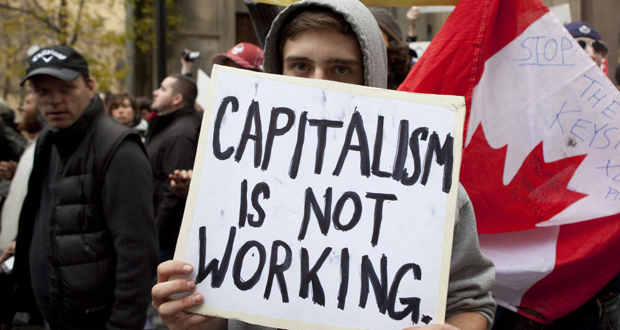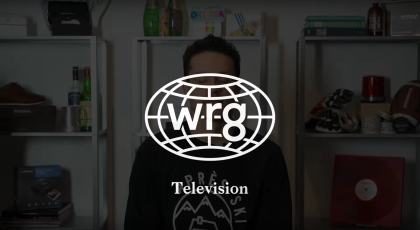
The Occupy Movement: Why the Banks?
Here is the preamble given on the website of the Occupy Wall Street gazette
Occupy Wall Street is leaderless resistance movement with people of many colors, genders and political persuasions. The one thing we all have in common is that We Are The 99% that will no longer tolerate the greed and corruption of the 1%. We are using the revolutionary Arab Spring tactic to achieve our ends and encourage the use of nonviolence to maximize the safety of all participants.
It is a transparent enough self- styled explanation but further elaboration might help…
In Webster’s Dictionary, the word ‘occupy’ is defined as:
1.to engage the attention or energies of,
2. To take up (a place or extent in space),
3. To take or hold possession or control of,
4. To reside in as an owner
Now, which of these four definitions sufficiently describes what the collection of individuals are doing at Bay and Adelaide streets, between CIBC, the Bank of Montreal, and TD Canada Trust?
‘To engage the attention or energies of’ is too obvious or perhaps general to offer any satisfactory explanation of what those duly concerned are truly doing.
‘To take up (a place or extent in space)’ is likewise useless insofar as we are in a sense always occupying Toronto at every moment of our material existence. We are always taking up some measure of space in Toronto, some more than others and especially so in Rob Ford’s case.
‘To take or hold possession or control of’ is starting to get to the meat of it but the achievement of such is beyond what is possible. Does Rob Ford really ‘control’ Toronto or would he be within the truth in claiming the city as a possession for himself? no, unequivocally. Any one person or movement can only exert influence over a city like Toronto, some more than others, and some considerably less.
‘To reside in as an owner’ is the crux of the thing, I submit.
Toronto residents, working people, and concerned citizens, the so-called ‘99%’ want a voice in how capital investments are administered in their city. They want to be treated as if they are owners and therefore in a position of power in Toronto (substitute your local city for Toronto)
As it currently stands, the relatively small amount of employees in 6 Canadian banks make the decisions on where money gets invested. The happy derivative of being an owner is that you are granted a profit from your status as a mere owner. Therefore, the 1% gain by the control and apportionment of the money of the 99% — The 99%, moreover, are told by the 1% that they are unfit to hear or contribute to the deliberation on the investment of money in their own country.
But the movement has some serious defects that are going to ultimately debilitate it. I was in Vancouver at the Occupy Vancouver, located at the Vancouver Art Gallery, and it appeared as nothing more than self-righteous individuals shouting half-baked slogans into a microphone. Although I was told I had just missed David Suzuki. Their purported goal of challenging the wealth gap in Canada has been resolved into a struggle to just stay in the square and camp and dance.
Yet in Toronto, organized labour, the many and various unions are blending their struggles over the amount on their paycheques with those demands of the Occupy Toronto and the wispy moniker ‘99%’ is being contextualize as the 99% who have really shitty jobs. Occupy Toronto is consciously advancing demands for banks to make investments in quality jobs.
Until recently, many were unaware that their economy had been rendered into a Banana Republic—an economic system where the upper crust maximizes their wealth and ensuring that the shortfalls are made up by the tattered rabble who congregate in pubs and are conveyed by subway.
Bankers have acted as if they are inscrutable, the Occupy movements are politicizing the economy in a way reminiscent of the 1920s, the question now becomes one of the strategy and tactics: how can the 99%, with little resources at their disposal except the sheer number of people, creatively advance a plausible alternative?
Here is the preamble given on the website of the Occupy Wall Street gazette
Occupy Wall Street is leaderless resistance movement with people of many colors, genders and political persuasions. The one thing we all have in common is that We Are The 99% that will no longer tolerate the greed and corruption of the 1%. We are using the revolutionary Arab Spring tactic to achieve our ends and encourage the use of nonviolence to maximize the safety of all participants.
It is a transparent enough self- styled explanation but further elaboration might help...
In Webster’s Dictionary, the word ‘occupy’ is defined as:
1.to engage the attention or energies of,
2. To take up (a place or extent in space),
3. To take or hold possession or control of,
4. To reside in as an owner
Now, which of these four definitions sufficiently describes what the collection of individuals are doing at Bay and Adelaide streets, between CIBC, the Bank of Montreal, and TD Canada Trust?
‘To engage the attention or energies of’ is too obvious or perhaps general to offer any satisfactory explanation of what those duly concerned are truly doing.
‘To take up (a place or extent in space)’ is likewise useless insofar as we are in a sense always occupying Toronto at every moment of our material existence. We are always taking up some measure of space in Toronto, some more than others and especially so in Rob Ford’s case.
‘To take or hold possession or control of’ is starting to get to the meat of it but the achievement of such is beyond what is possible. Does Rob Ford really ‘control’ Toronto or would he be within the truth in claiming the city as a possession for himself? no, unequivocally. Any one person or movement can only exert influence over a city like Toronto, some more than others, and some considerably less.
‘To reside in as an owner’ is the crux of the thing, I submit.
Toronto residents, working people, and concerned citizens, the so-called ‘99%’ want a voice in how capital investments are administered in their city. They want to be treated as if they are owners and therefore in a position of power in Toronto (substitute your local city for Toronto)
As it currently stands, the relatively small amount of employees in 6 Canadian banks make the decisions on where money gets invested. The happy derivative of being an owner is that you are granted a profit from your status as a mere owner. Therefore, the 1% gain by the control and apportionment of the money of the 99% -- The 99%, moreover, are told by the 1% that they are unfit to hear or contribute to the deliberation on the investment of money in their own country.
But the movement has some serious defects that are going to ultimately debilitate it. I was in Vancouver at the Occupy Vancouver, located at the Vancouver Art Gallery, and it appeared as nothing more than self-righteous individuals shouting half-baked slogans into a microphone. Although I was told I had just missed David Suzuki. Their purported goal of challenging the wealth gap in Canada has been resolved into a struggle to just stay in the square and camp and dance.
Yet in Toronto, organized labour, the many and various unions are blending their struggles over the amount on their paycheques with those demands of the Occupy Toronto and the wispy moniker '99%' is being contextualize as the 99% who have really shitty jobs. Occupy Toronto is consciously advancing demands for banks to make investments in quality jobs.
Until recently, many were unaware that their economy had been rendered into a Banana Republic—an economic system where the upper crust maximizes their wealth and ensuring that the shortfalls are made up by the tattered rabble who congregate in pubs and are conveyed by subway.
Bankers have acted as if they are inscrutable, the Occupy movements are politicizing the economy in a way reminiscent of the 1920s, the question now becomes one of the strategy and tactics: how can the 99%, with little resources at their disposal except the sheer number of people, creatively advance a plausible alternative?
http://www.youtube.com/watch?v=-QWpX1k-huU








